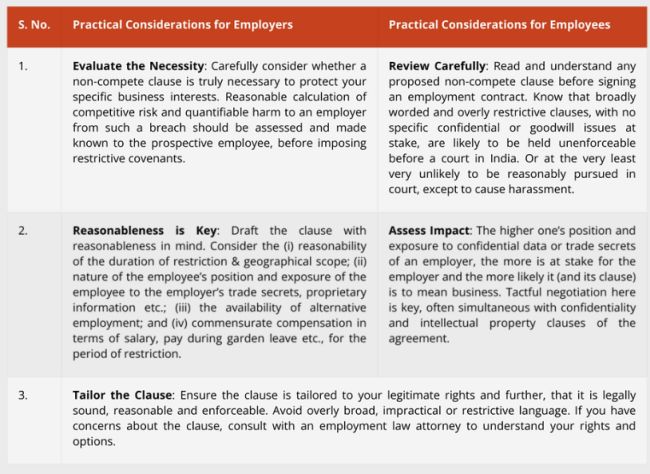In the ever-evolving landscape of present-day employment contracts, employers and employees are often faced with the dilemma of interpretation and enforcement of non-compete clauses. These clauses which were earlier reserved for senior-level and key managerial personnel have now penetrated almost every employment contract, impacting employers, employees and professionals at varied levels.
Simply put, a non-compete clause restricts an employee's ability to work for a competitor or engage in similar businesses, typically within a defined geographical area and for a specified period, which may be during and also post their exit from the current job. These clauses inter alia aim to protect an employer's trade secrets, proprietary and confidential information, and customer relationships from potential exploitation by former employees.
The rapid pace of technological advancements, the rising gig economy and increasing remote working options have transformed the traditional notions of employment, due to which enforcement of non-compete clauses has become more complex and is often caught between safeguarding employer interests and protecting employee rights. In this article, we have delved into the intricacies of such clauses.
Historical Perspective and the Rule of Reasonableness
Indian courts have historically adopted a strict approach to non-compete clauses, citing Section 27 of the Indian Contract Act, 1872 ("ICA"), which prohibits agreements that restrain trade, save when the restriction is tied to the sale of goodwill. This strict stance stemmed from the belief that such clauses could unduly restrict an individual's right to work and earn a livelihood.
However, as India's economy matured and businesses grew more complex, courts began to recognize the need for a more nuanced approach. The landmark case of Niranjan Shanker Golikari v The Century Spinning Company 1 marked a significant shift, introducing the concept of the 'rule of reasonableness.' This rule considers factors such as:
- The duration of the restriction;
- The geographical scope;
- The nature of the employee's position; and
- The availability of alternative employment opportunities.2
The ultimate objective is to ensure that the non-compete clause safeguards the employer's legitimate interests, while simultaneously not unduly restricting the employee's ability to work. Of course, the determination of what constitutes legitimateinterest is contingent upon the facts of the matter and lies within the discretion of the presiding court. Resultantly, a plethora of judgments ensued after the Century Spinning Case — some relying on and upholding the concept of reasonableness; yet some, declaring Section 27 of the ICA to be steadfast in its intent, rendering any attempts to deviate from it as void.
That said, the burden of proof lies heavily upon the claimant, and once discharged the onus of proving otherwise nevertheless shifts to the counterparty 3. The burden of proof would be the reasonableness of the restriction as well as the necessity of the restriction to protect the interest of the employer/party seeking to enforce the covenant.
Practical Considerations

Conclusion: A Balancing Act
We believe that it is imperative to strike a balance between protecting an employer's legitimate business interest and the employee's right to pursue gainful employment, after careful consideration of ethical, legal and practical factors. The key here is the reasonableness of such clauses. It is our personal view that reasonable, practical, nuanced, enforceable and tailored clauses are a prerequisite in holding the reasonableness of such terms.
Footnotes
1. AIR 1967 SC 1098. In this case, the dispute was over the restraint of disclosure of sensitive information and technical know-how by an employee, which the employee learned during a specific training period while employed with the employer. The respondent-employee had, inter alia, agreed to not disclose or compete for a specific period in his employment contract; but, after training, resigned in favour of a similar job at a competitor company engaged in the same activity i.e., continuous spinning yarn. The Hon'ble Apex Court not only distinguished between special information and general knowledge — holding the former to be that of the employer, while the latter to be the 'asset of the employee', not being subject to restraint — but also observed that restraints on an employee during his employment, would, generally not surmount to restraint on trade. It effectively held that, 'any restraint of trade for the protection of trade secrets is reasonable if restricted to time, nature of employment and area'.
2. Gujarat Bottling Company Limited v Coca-Cola Company, AIR 1995 SC 2372. Here, the Supreme Court held that a non-compete clause that prohibited a franchisee from bottling and selling other brands of aerated drinks during the term of the franchise agreement was enforceable, provided that the restriction was reasonable in terms of its duration and geographical scope.
3. Sandhya Organic Chemicals v United Phosphorus Ltd, AIR 1997 Guj 177; Niranjan Shanker Golikari v The Century Spinning Company, AIR 1967 SC 1098.
The content of this article is intended to provide a general guide to the subject matter. Specialist advice should be sought about your specific circumstances.


